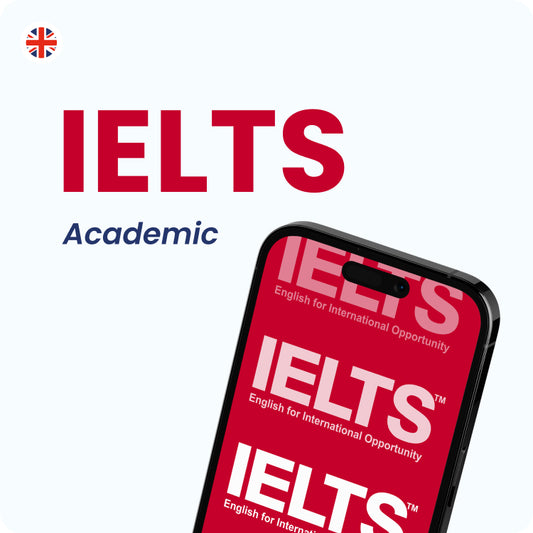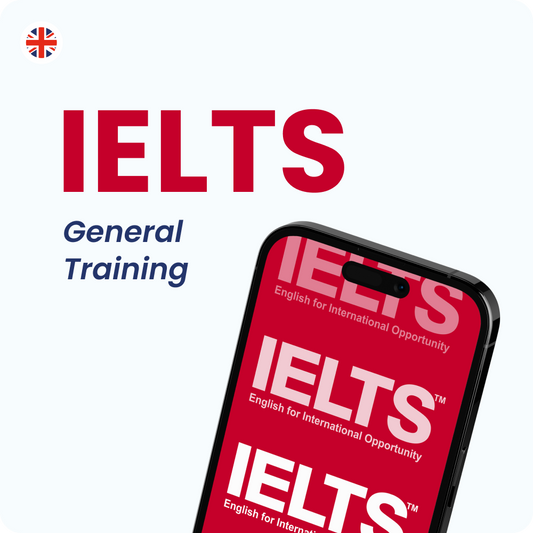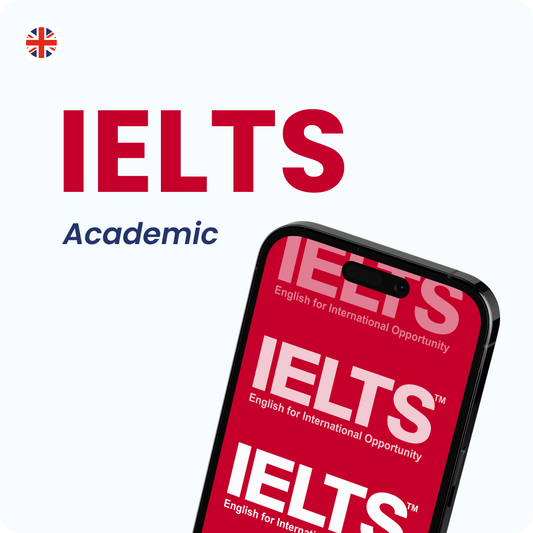IELTS 2025 Test Practice
The IELTS is one of the most popular English language tests in the world. Recognized by many universities and international companies, it is also accepted by authorities for immigration purposes. Discover the different versions of the IELTS, the test format, and tips for practicing and succeeding on the big day.
Associated collection
-
IELTS Academic Mini-Test
Regular price 0€Regular priceUnit price / per -
IELTS General Training
Regular price 99€Regular priceUnit price / per -
IELTS Academic
Regular price 99€Regular priceUnit price / per
IELTS 2025 test practice
What is IELTS?
The IELTS ( International English Language Testing System ) is a standardized test co-managed by the British Council, the University of Cambridge and IDP Education Australia. It is intended for anyone who wishes to have their level of English recognized with a view to studying, working or immigrating to an English-speaking country (United States, United Kingdom, Australia, New Zealand, Ireland, etc.).
Considered one of the most reputable tests in the world, IELTS is recognized in more than 140 countries and accepted by more than 12,500 organizations (universities, businesses and government institutions).
Once obtained, the IELTS is valid for two years.
The 2 versions of the IELTS
The IELTS test comes in two versions:
-
IELTS Academic , intended for students who plan to enter a university course in English, from bachelor's to doctoral level, as well as for professionals who wish to work within a company in an English-speaking country;
- IELTS General Training , intended for professionals and people wishing to begin immigration procedures to an English-speaking country.
The IELTS tests
The IELTS consists of four parts assessing four language skills in the following order:
- Listening comprehension;
- Written comprehension;
- Written expression;
- Oral expression.
These tests are identical in format for both versions of the IELTS (Academic and General Training), with the exception of reading comprehension (part two) and writing expression (part three).
Part One : Listening
The listening comprehension test is common to both versions of the test. You must first listen to four audio recordings:
- a conversion between two people (context of everyday life);
- a monologue (context of everyday life);
- a conversation between several people (academic or professional context);
- a monologue (academic context).
After listening, you must answer several questions in different formats: multiple choice questions, sentence completions, correspondences between a statement and its speaker, etc.
Lasting 30 minutes, this first test assesses your ability to understand ideas, specific information, the opinions of speakers, but also to follow a line of reasoning.
Part Two: Reading Comprehension
For this second part, you must answer 40 questions after reading:
-
For IELTS Academic: 3 long texts (extracts from newspapers, magazines, books, etc.) selected for a non-specialist audience;
- For IELTS General Training: 4 or 5 short texts (on factual or professional topics) and one long text (on a topic of general interest).
Lasting 60 minutes, this test aims to measure your ability to grasp the main ideas of the text, detailed information, opinions or intentions of the authors.
Part Three: Written Expression ( Writing )
The written expression test consists of two exercises, in which you must:
-
Describe, explain or summarize in your own words the information contained in a diagram or table (for IELTS Academic) or write a letter to request information or explain a situation (for IELTS General Training) in at least 150 words;
- Write an essay in response to a question, opinion, problem or argument in at least 250 words.
Lasting 60 minutes, the test tests your ability to write in a personal or formal style.
Part Four : Speaking
Common to both versions, the last part is an oral interview in front of an examiner. It lasts between 10 and 14 minutes and is composed of 3 parts:
- The examiner asks you personal questions about your family, work, interests, etc. (4-5 minutes);
- You speak on a set topic (1 minute of preparation and 2 minutes of speaking). The examiner then asks you 2 questions on this topic;
- The examiner will ask you questions about the topic covered in the second part so that you can develop your ideas (4-5 minutes).
This test assesses your oral fluency and your mastery of vocabulary.
Understanding the notation
For both versions, each part of the IELTS test is marked on a scale of 1 to 9. An average is then calculated to obtain a final mark, also marked from 1 to 9.
Each grade corresponds to a certain level of English proficiency:
- 0: The candidate did not show up for the test ( “ Did not attempt the test ” );
- 1: Very low mastery ( “ Non user ” );
- 2: Low mastery ( “ Intermittent user ” );
- 3: Extremely limited user ;
- 4 : Limited user ;
- 5: Modest level ( “ Modest user ” );
- 6: Competent level ( “ Competent user ” );
- 7 : Good user ;
- 8: Very good user ;
- 9: Excellent mastery ( “ Expert user ” ).
Depending on the university or company you're applying to, a minimum overall score may be required. Be sure to check your organization's required score before committing to your project.
How to train for IELTS?
Like any certification, the IELTS requires regular training to familiarize yourself with the test format and learn how to manage your time.
Whether you want to take an IELTS General Training test preparation course or IELTS Academic test preparation , practice with exam questions and practice tests to get used to the instructions for the four skills being assessed.
For both versions of the test, the IELTS training program offered by PrepMyFuture includes a mini-test, four practice tests, 42 course sheets, and more than 1,700 practice exercises. The content is available in French and English and includes methodology tips for all parts of the test.
How to register for the exam?
Registration for the IELTS is done by choice:
- At a British Council approved test centre;
- On the IELTS website ;
- On the British Council website .
When registering, you must provide a scanned copy of your ID. Check the validity date of your identity documents: on the day of the exam, you will need to present the same ID document that you registered on the day of registration. In case of change, you must notify the British Council at least 72 hours before the test.
Space is limited for each session, so it is recommended to register 2 to 3 months before the test date.
Where to take the test?
You can take the IELTS at an authorized test center.
In France, the British Council only recognizes 9 centers: Bordeaux, Nantes, Lyon, Nice, Lille, Paris, Marseille, Strasbourg and Toulouse.
Depending on the center chosen, the exam is carried out either on computer or on paper.
Some test centers (Lyon, Marseille, and Nantes) administer all the test sections on the same day (Saturday), while others (such as Paris) spread the tests over several days. When registering and choosing a test date, make sure you are available on all test days.
Please note: The IELTS can also be taken remotely from home. However, this option is not accepted by the authorities if you are taking the test as part of an immigration application.
Why take the IELTS?
IELTS Academic and IELTS General Training are among the most popular tests in the world. Holding the IELTS certification can help you if you want to:
-
Study at an English-speaking university: Top English-speaking universities, including those in the UK, Canada, Australia, and New Zealand, require a minimum IELTS score of 6 or 7 for admission;
-
Working abroad: IELTS is also recognized by many companies around the world. Getting a good IELTS score can support your application or help you stand out from other candidates;
- Immigrating to an English-speaking country: Authorities in most English-speaking countries require a certain IELTS score depending on the type of visa you are applying for, so it is important to be well prepared to maximize your chances of having your application accepted.
Tips for passing the IELTS
Beyond your English level, success on the IELTS test depends on your understanding of the test format and your ability to manage your time.
To give yourself the best possible chance on the big day, plan a revision schedule over several weeks, including targeted practice on each skill and timed practice tests.
Depending on your strengths and weaknesses, establish specific strategies for each test:
- Improve your listening comprehension by regularly listening to English shows or podcasts with different accents and practicing taking notes;
- Work on your written comprehension by reading daily press articles in English or extracts from novels;
- Practice your writing skills by practicing writing texts using exercises and practice tests. Make sure you respect the required word count;
- Work on your oral expression by interacting as often as possible with native speakers or trainers. When it comes to language, only regular practice will allow you to gain fluency and improve your pronunciation.
With structured IELTS practice, you increase your chances of success and will be more comfortable and confident on exam day.
FAQ
- What the IELTS test contains
- How much does IELTS cost?
- How to calculate your score for IELTS General Training and IELTS Academic?
- How is the IELTS score calculated?
- How does the IELTS test work?
- How does the IELTS test work?
- How to register for the IELTS test?
- IELTS test duration
- IELTS - Presentation
- Interpreting IELTS Results
- IELTS Test Scoring
- Where to take the IELTS?
- Why take the IELTS test?
- What is IELTS ACADEMIC?
- What are the differences between TOEFL and IELTS?
- Retake the IELTS test
Associated collection
-
IELTS Academic Mini-Test
Regular price 0€Regular priceUnit price / per -
IELTS General Training
Regular price 99€Regular priceUnit price / per -
IELTS Academic
Regular price 99€Regular priceUnit price / per
FAQ
Frequently Asked Questions
What is PrepMyFuture and how does it work?
PrepMyFuture is a 100% online platform dedicated to preparing for language tests and certifications. Once registered, you'll access a structured program with courses, interactive exercises, and progress tracking tools.
How are PrepMyFuture courses different?
Our courses are designed specifically for each certification (TOEIC, CLOE, etc.), with targeted content, realistic training, immediate feedback and personalized support.
Were the contents designed with official publishers?
Yes. For some certifications, such as the TEF, we use official content provided by the CCI of Paris Île-de-France to prepare you in conditions as close as possible to the actual exam.
How do I track my progress on the PrepMyFuture platform?
You have a personalized dashboard to track your results, visualize your progress and identify the skills to strengthen at each stage of the training.
*What is PrepMyFuture's money-back policy?
To obtain a refund, the request must be submitted within 7 days of purchase and must have completed fewer than 100 questions. The request must be sent to Adm@7speaking.com .



